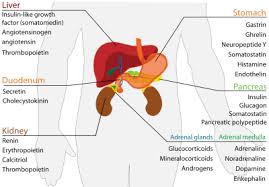endocrine
英 [ˈen.də.krɪn]
美 [ˈen.də.krɪn]
- n. 内分泌;激素;内分泌物
- adj. 内分泌的;激素的
星级词汇:

记忆方法
记忆“endocrine”的方法是将它拆分为两个部分:“endo”和“crine”。想象一个“endo”代表的是“inside”或“within”,意味着这是在身体内部的。而“crine”可以联想到“create”或“production”,表示制造或分泌。因此,将这两部分结合起来,就可以想象为身体内部的“制造所”或“分泌中心”,这样就可以记忆为“endocrine”指的是内分泌系统。
以上内容由AI生成, 仅供参考和借鉴
中文词源
endocrine 内分泌
endo-, 内,里面,来自en-的扩大形式。-crine, 分开,分泌,词源同crisis, discriminate.
英语词源
- endocrine (adj.)
- "secreting internally," 1914, from endo- + Latinized form of Greek krinein "to separate, distinguish" (see crisis). Denoting glands having an internal secretion.
权威例句
- 1. Not to mention the physical effects of neural or endocrine overload.
- 更不用说神经和内分沁超负荷对身体的影响了.
- 2. It is also an endocrine gland secreting at least two important hormones.
- 它也是一种内分泌腺,至少分泌二种重要的激素.
- 3. It performs both an exocrine ( egg release ) and endocrine ( estrogen and progesterone secretion ) function.
- 卵巢同时具有外分泌 ( 释放卵子 ) 和内分泌 ( 产生类固醇激素 ) 的功能.
- 4. The duration of pregnancy may be influenced by the endocrine functions of the fetus.
- 胎儿的内分泌机能亦可影响妊娠期.
- 5. Accompanying the biochemical, metabolic, and visceral changes are a series of endocrine alterations.
- 在生化 、 代谢以及内脏发生变化的同时,还有一系列的内分泌变化.